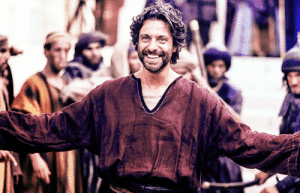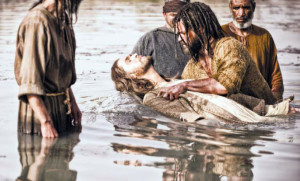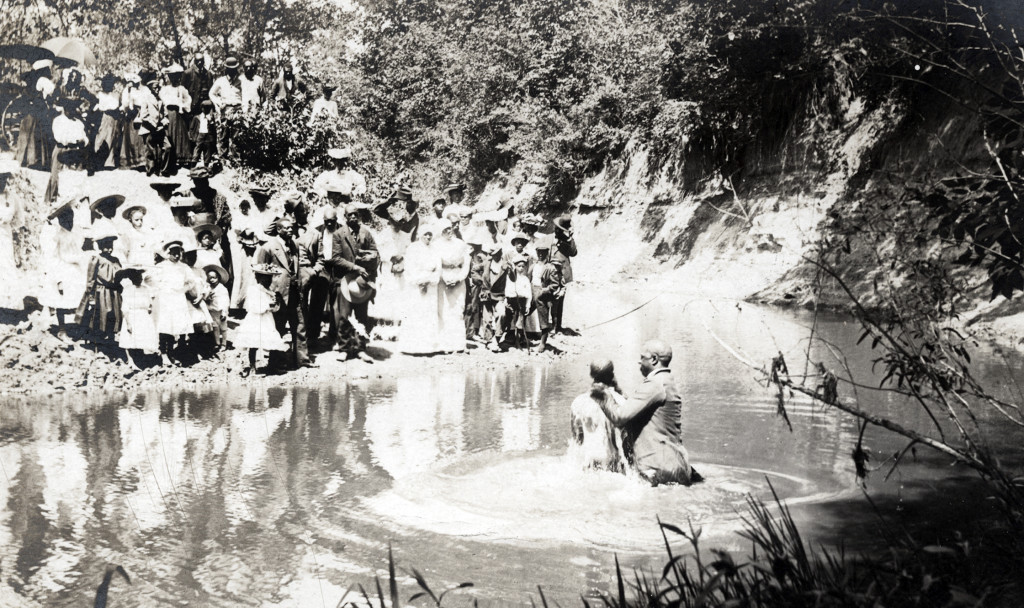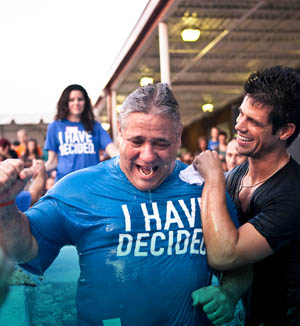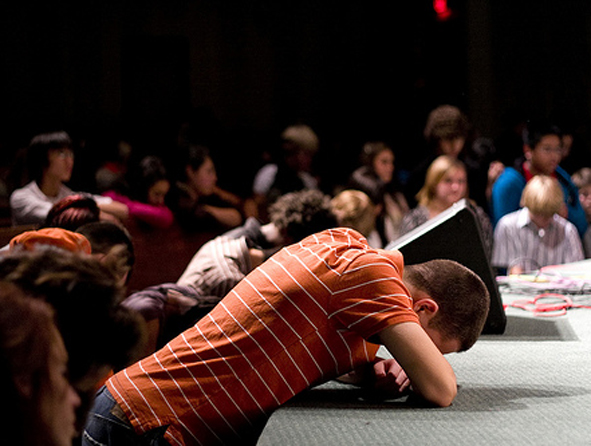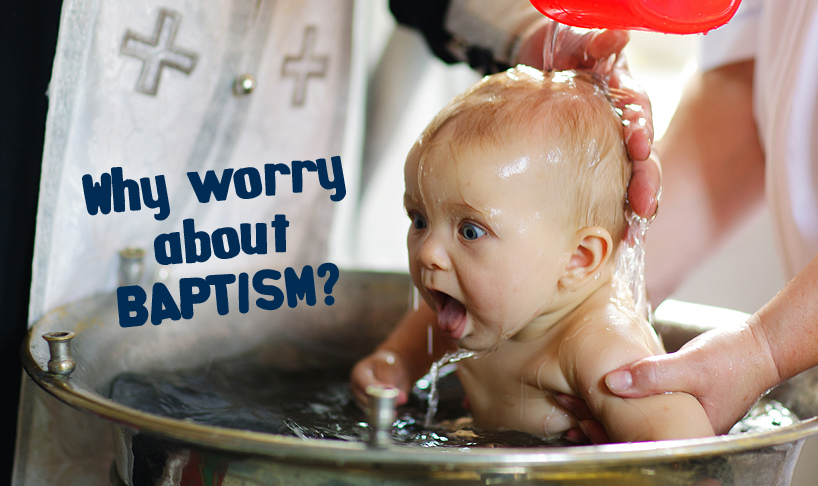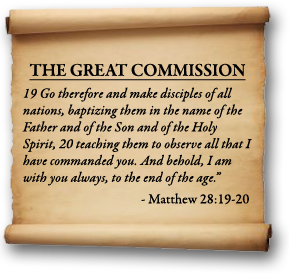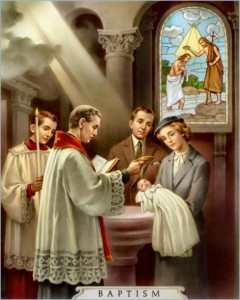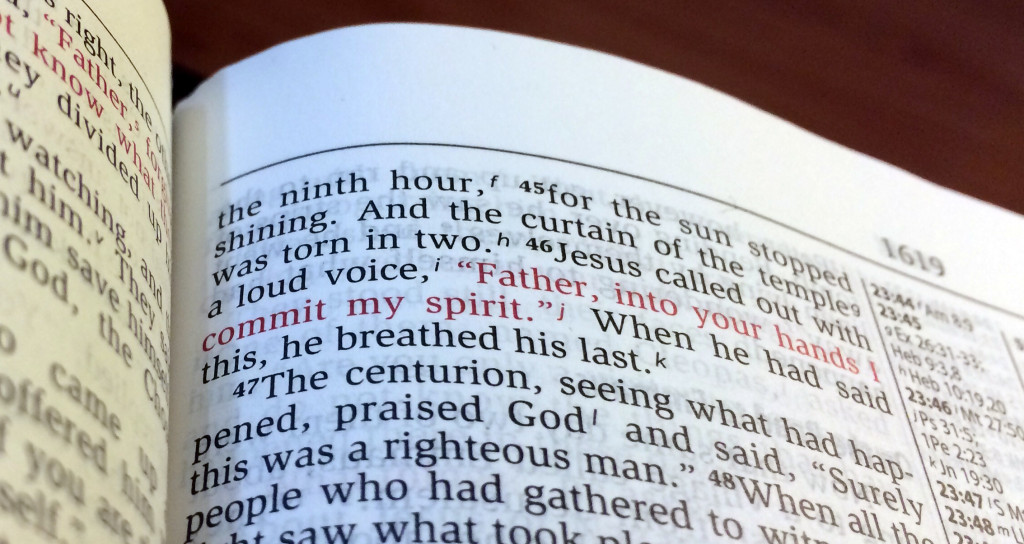Infant Baptism – where I have landed
This is the inevitable follow-up article from my previous post entitled: “9 things I like about Credobaptism (as a pedobaptist)”. Before reading on, I encourage you to read this article to see the respect I have for credobaptism. I wrote that article because I wanted to first show that I had not simply glossed over the credobaptist arguments and I wanted to state clearly that I think they aren’t bad. In fact some of them are weighty and I would not blame anyone for being convinced of credobaptism because of them.
 My journey exploring the issue of baptism has felt a little like someone throwing a ball up in the air on a windy day. Each argument I read blew me in different directions. I’d hear one good argument and I’d be pushed towards one position, then I’d read counter-arguments, or think of some myself, and I would be blown in the other direction. This to-ing and fro-ing has gone on for the last 20 years – ever since I became a Christian. But a ball can only stay in the air for so long. Eventually, gravity will pull it back down and you will see where it has landed. For me, the force of gravity has been the birth of my daughter.
My journey exploring the issue of baptism has felt a little like someone throwing a ball up in the air on a windy day. Each argument I read blew me in different directions. I’d hear one good argument and I’d be pushed towards one position, then I’d read counter-arguments, or think of some myself, and I would be blown in the other direction. This to-ing and fro-ing has gone on for the last 20 years – ever since I became a Christian. But a ball can only stay in the air for so long. Eventually, gravity will pull it back down and you will see where it has landed. For me, the force of gravity has been the birth of my daughter.
Basically, before you have a child, the debate over whether or not Christians should baptise their children is mainly theoretical. But when a child comes on the scene, you have to choose which side of this debate you fall on. To not decide is to decide credobaptism, as if you come to agree with pedobaptism when your kid is 20 years old, you have sort of missed the boat! So gravity has been pulling and the winds of arguments have done their blowing, and as the ball hits the ground, I find that I have landed on the side of pedobaptism… sort of.
What I mean by “sort of” is that I have not come to the conviction that all Christians must choose to baptise their children. I have definitely not come to think that Credobaptists are sinning or disobeying Scripture by choosing not to have their kids baptised. As I expressed in my last article, I think there are valid reasons to believe Credobaptism, and if the winds of those arguments have blown you on that side of the fence, then I understand. As for me, although I was pushed by those winds, I either found weaknesses in the arguments for credobaptism, or I found the pedobaptist winds were stronger. Some may say, “You should have read this book, or listened to this sermon, or downloaded this thesis”, and you may be right. In an ideal world, I would have loved to have been exposed to many more winds and I honestly can’t say that with more reading I wouldn’t have been convinced to change my position. But gravity is gravity, and I did my best to do my reading, discussing, thinking and praying within the time I had. The ball has fallen and I am at present convinced of this position:
It is gospel-honouring, biblically appropriate, scripturally permissible and even spiritually helpful for Christian parents to have their children baptised.
To flesh out that conviction and to explain some of the “winds” that blew me to land there, here are 6 conclusions I have made.
1. I believe the act of baptism does not save you.Â
This may be obvious to most, and my Catholic family and friends may not even be aware that this is what the Catholic Church teaches, but it needs to be stated first and as clearly as possible. Getting baptised – whether as a child or an adult – does NOTHING to you spiritually. What I mean by that is that the act by itself, does not affect your relationship with God. If you were a stranger to God before getting baptised, you will be one after. Baptism will not save you from hell, it will not give you God’s Spirit and it will not regenerate you (make you “born again”). On this point, I strongly disagree with the Catholic Church when they specifically teach: “Through Baptism we are freed from sin and reborn as sons of God; we become members of Christ, are incorporated into the Church and made sharers in her mission: Baptism is the sacrament of regeneration through water in the word.â€Â I believe this is profoundly false. In relation to infant baptism, if you were thinking of getting your child baptised in order to somehow secure them getting into heaven or to impress God or to even just to have some religious spiritual box ticked off, know that it won’t do any of that.
Cat & I have concluded that it is appropriate for us to have our daughter baptised, but you should know, we believe that her salvation (her being forgiven and cleansed for all her sin, being given a new heart and entering into a right relationship and standing with God both in this life and the next) is reliant completely on the mercy of God. The bible says clear as crystal: “It is by grace you have been saved, through faith — and this is not from yourselves, it is the gift of God — not by works, so that no one can boast.” (Ephesians 2:8-9) For her to be saved, our daughter will need to choose Christ, not rejecting his offer of forgiveness but trusting in his atoning death for her on the cross. Baptism won’t do it, her parent’s faith won’t do it, her good works won’t do it… only Jesus will do it. And so, Cat & I are, even now, praying that God shows her mercy and gives her the saving faith that the passage calls a “gift of God”. Whether we baptise her or not will not change her eternal destiny and it definitely won’t sway God to be more likely to show her mercy.
So, if IÂ think baptism doesn’t change her state with God, what is baptism about?
2. I believe baptism is a symbol of salvation.
Although the act of baptism itself doesn’t cause salvation, it is a symbol of salvation. There is lots of different imagery wrapped up in baptism. Water is a powerful element and having water poured on you or being submerged in water can express various ideas, but the simplest idea is that of washing. In baptism, the physical act of being washed with water symbolises the spiritual act of Jesus washing our sins away (see Matthew 3:11, Acts 22:16,  Titus 3:5, 1 Peter 3:21).
So, don’t take my first point to imply I think the act of baptism does nothing at all – it does something very meaningful. It points us to a spiritual reality. In the same way that the bible says that the Old Testament laws and sacrifices were a shadow pointing to spiritual realities that are found in Christ (Colossians 2:17 & Hebrews 10:1-10), the physical act of baptism is a shadow of the spiritual cleansing that we all need in order to be right with God.
3. In the bible, symbolic acts can point forward as well as back.
This is pretty obvious I guess, if you know your biblical symbols. Here are a few examples:
- Circumcision pointed forward to the”circumcised heart” that the person needed to have. (Jeremiah 9:25-26).
- The rainbow points forward to God’s promise never to flood the world again (Genesis 9:12-16).
- The animal sacrifices pointed forward to Jesus’ sacrifice once for all (Hebrews 9:11-14 & Hebrews 10:1-10).
- The Passover lamb pointed forward to Jesus dying so that God’s judgment may “pass over” us (1 Corinthians 5:7).
- Even marriage points forward to the union of Jesus with the church as his bride that will be culminated at the “wedding supper of the Lamb” (Ephesians 5:31-32 & Revelation 19:7-9)
Now when it comes to baptism, some credobaptists claim that if baptism symbolises the washing away of sin, it must only look backwards to the fact that the person being baptised has already had their sins washed away. Now, if someone is baptised after they have converted and been forgiven, then yes, it does point backwards. But as we can see from the above examples, biblical symbolism doesn’t always point that way. It is quite consistent with scripture (at least principally) to think that a symbol like baptism could also point forward. In the case of children born to those converted to Christ, their baptism doesn’t point to a spiritual event in the past, nor does it point to any spiritual event happening during the baptism. Infant baptism points forward. It points to the promise that if they put their trust in Christ, he will wash away their sins.
4. The principle seen in circumcision.
The Old Testament practise of circumcision illustrates the principle perfectly. When Abraham believed God’s promises, God “credited him with righteousness” (Genesis 15:6). It was after that, that Abraham was introduced to the symbolic act of circumcision (Genesis 17:10-14). It was a sign of the right relationship – the covenant – that God had established with Abraham and with his descendants. His children and all in his household (remember that word, it will be relevant later) were also brought into this covenant. As Abraham led his household, so his children were introduced to the faith that he had embraced. This is why God commands Abraham to also circumcise his children (the males, at least). Abraham’s physical circumcision looked back to his the fact that he had experienced a”spiritual” circumcision (what the bible calls a “circumcised heart”) when he embraced God’s promises. But his 8 day old sons had no such experience. They had not been spiritually circumcised, but God still wanted them to be physically circumcised. Abraham’s circumcision pointed back, but his children’s circumcision pointed forward.
Now, some pedobaptists put too much of a connection between circumcision and baptism, suggesting that baptism directly replaces circumcision. I don’t actually think that argument is very strong. Still, one can not deny the principle that God endorses in the act of circumcision being given both to the believing and to the children in their household. I don’t think baptism is the exact replacement of circumcision, but I do think that the principles used in circumcision in the Old Testament can (and possibly should) be applied to baptism in the New Testament.
Like Abraham with circumcision, when a new believer in Christ converts, they should get baptised. And like with Abraham, those in the household of the new believer – including infants – should receive this sign as well. This is the pattern from the very beginning, as parents are charged with the responsibility of passing on the faith and teaching their children about the promises of God.
Also, for those that are concerned by the dilemma, “What if I baptise my child but they eventually reject the gospel?”, that is not a new problem. The children circumcised into the faith of God’s people in the Old Testament weren’t guaranteed salvation. Some of them eventually rejected the faith, and God knew they would, and God still commanded them to be circumcised as infants. Being circumcised didn’t guarantee them faith, but it did open them up to rebuke if they only had a physical circumcision with no change of heart. Through Jeremiah, God warned his people, “The days are coming…when I will punish all who are circumcised only in the flesh… For all these nations are really uncircumcised, and even the whole house of Israel is uncircumcised in heart.” (Jeremiah 9:25-26). I think that baptism is like this. Children of believers get physically baptised, with the awareness that they need to also be spiritually baptised.
Now, some suggest that since Jesus came with the gospel, the principles used with circumcision in the Old Testament shouldn’t be applied to Christians in the New Testament. But when I look in the book of Acts, that’s not what I see. What you find, several times over, is when someone converts to Christ, not only do they get baptised but so does their entire household (Acts 16:15, 16:31-34, 18:8 & 1 Corinthians 1:16). In fact, one of the very few exceptions to this is the Ethiopian eunuch in Acts 8:26-39, who naturally, being a eunuch, did not have any children. It seems the records of baptism in the New Testament support the view that the first Christians related to baptism with the same “household” principle that they did with circumcision.
To explain how this applies to me personally, my wife Cat & I are converts to Christianity. We both embraced the gospel in our teens and we have both been baptised (me before my conversion and my wife after hers). And now that we have been blessed with a little girl, we feel that since she is a member of our household, it is appropriate and good for us to have her baptised as well. As Joshua said to the people, “As for me and my household, we will serve the Lord” (Joshua 24:15). Our daughter’s baptism will point forward to the spiritual truths that we will raise her to know and embrace – that Jesus is the Lord that we serve and that if she trusts in him, he will wash away her sins.
5. I believe the biblical instruction (and lack thereof) supports pedobaptism.
Now, all this discussion about the principles of circumcision and the direction of biblical symbolism, really counts for nothing if the bible tells us whether or not children born into converted households should get baptised… but it doesn’t. There are many cases of instructions given to new converts about whether they should get baptised – they should. But there is not one direct instruction to those converts as to what they should do with their kids.
So why do I think that the text supports pedobaptism? Well, you have to think about what would have been the assumption of the new converts. I think the cultural evidence suggests that new Christians in the first century would have assumed that when they embraced the gospel, turned to Jesus as their Lord and gotten baptised, that they would also baptise the children in their household, and as I’ve said, the “household baptisms” in Acts seem to give some evidence that this was the case (acknowledging that no infants are specifically mentioned). Now, if this is true, we shouldn’t be looking for an instruction TO baptise children, we should actually be looking for an instruction NOT to. But there is no teaching or instruction that would forbid converts from baptising their children.
 On top of that, if converts were expected not to baptise their children, then we should expect other instructions as well. For instance, where is the instruction to the children brought up by converted parents that they should one day make a “profession of faith” and get baptised? Where is the instruction to parents to encourage their children to get baptised when they have matured? Where is the instruction to church leaders as to how to discern which children are “qualified” for baptism?
On top of that, if converts were expected not to baptise their children, then we should expect other instructions as well. For instance, where is the instruction to the children brought up by converted parents that they should one day make a “profession of faith” and get baptised? Where is the instruction to parents to encourage their children to get baptised when they have matured? Where is the instruction to church leaders as to how to discern which children are “qualified” for baptism?
These are commonplace issues that credobaptist churches face today and if credobaptism was the norm in the first century church, one would expect these issues to be addressed somewhere in the New Testament. But they aren’t. In fact, when Paul does address children in the church, his only instruction is not for them to consider “becoming” a Christian, but simply to live out being one. He instructs children to “obey your parents in the Lord” (Ephesians 6:1) giving no indication that the Christian community is made up of some baptised believing kids and some non-baptised kids. There is no suggestion that children are categorised in this way. If they are in the community of believers, they are related to as being “in the Lord”. Now, to me, these words of Paul seem to support a pedobaptist understanding of how children are to be viewed. Unless they one day reject the gospel, the children of converts are considered to be “in the Lord” from the beginning.
Now, it is true, both sides of this debate have to grapple with the absence of clear, biblical instruction about whether Christians should or should not baptise their kids. But after considering what we would expect to find if either was true, I have concluded that the absence of any instruction is a greater problem for credobaptists than pedobaptists. In fact, if the practice of baptising children was as assumed in the first century as the practice of circumcising them, then the absence of any instruction is actually unsurprising. You don’t have to instruct what would be assumed.
Now, all this doesn’t prove anything, but it does show the weakness of the primary credobaptist argument – namely, that scripture is clear in its instruction about baptism and those who advocate for infant baptism are simply adding to scripture. I don’t think the New Testament, nor the flow of the whole bible, really supports that view. As much as I do not judge my credobaptist friends, I actually think their decision to withhold baptism from the infant members of their household would have, for the average converted Jew, been considered quite odd in the first century.
6. I believe history supports pedobaptism.
The key mystery at the heart of this debate is What did the first Christians actually do? What was the common practice of the early church? Which view did the apostles endorse? I call it a mystery because the biblical record really isn’t clear. In the New Testament’s four narrative books, we have no explicit record of a baby being baptised. But, we also have no explicit record of converted parents choosing to not baptise their baby, and we have no record of a child being brought up in a converted household who eventually “owns” their faith at some point and then gets baptised. On top of the biblical record, as I have shown, we have no teaching in the epistles that would clearly instruct parents one way or the other! No wonder Christians have been arguing about this for centuries. Which brings me to my next point. What has been happening for centuries? And more specifically, what about the first couple of centuries? If the biblical record doesn’t give us a clear picture, what does the historical record say?
Well, there isn’t heaps to go on, but the earliest record that we have discussing infant baptism is in documents written by a Christian author named Tertullian who lived 155-240 AD. He talks about infant baptism as if it is pretty commonplace, though he suggests that “the delay of baptism is preferable; principally, however, in the case of little children. For why is it necessary—if (baptism itself) is not so necessary — that the sponsors likewise should be thrust into danger? Who both themselves, by reason of mortality, may fail to fulfil their promises, and may be disappointed by the development of an evil disposition, in those for whom they stood? The Lord does indeed say, ‘Forbid them not to come unto me.’ Let them ‘come,’ then, while they are growing up; let them ‘come’ while they are learning, while they are learning whither to come; let them become Christians when they have become able to know Christ.”
So Tertullian here is giving advice that delaying baptism of infants might be preferable. His argument is not that infant baptism is uncommon, or unbiblical, or not permissible. His argument seems to be that the promises that the “sponsors” make when they bring the baby for baptism, may not be able to be fulfilled, and that may make waiting a better option. Tertullian does acknowledge Jesus’ words in Matthew 19:4 as a good reason to bring babies to be baptised, but suggests waiting til they are a bit older and “become able to know Christ”.
Tertullian seems to discourage infant baptism, but he does so in a context where infant baptism is the normal practice. Also, if you’re a credobaptist, before you get all excited and supportive for Tertullian’s advice, he also goes on to say: “For no less cause must the unwedded also be deferred—in whom the ground of temptation is prepared, alike in such as never were wedded by means of their maturity, and in the widowed by means of their freedom—until they either marry, or else be more fully strengthened for continence. If any understand the weighty import of baptism, they will fear its reception more than its delay: sound faith is secure of salvation.”
So, if you didn’t catch that, for the same reasons he thinks babies shouldn’t get baptised, he also thinks single people shouldn’t get baptised either. Clearly, we must not see Tertullian as the authority on what we should or should not do in regard to baptism! Fortunately, he does serve to show us that infant baptism was commonly being practised around 200 AD. Possibly the reason why he is the first commentary on infant baptism, is because for the first two centuries no one had reason to raise any concerns about the practice.
Around the same time as Tertullian, we have Hippolytus of Rome who lived 170-235 AD and was the most important Christian historian of his day. Although is it disputed by some, he is attributed to writing a document called “Apostolic Tradition”, around 10 years after Tertullian’s writings. As the name of his document suggests, Hippolytus’ purpose was to write the tradition handed down by the apostles as he knew it. His brief reference to infant baptism is as follows: “First you should baptise the little ones. All who can speak for themselves should speak. But for those who cannot speak, their parents should speak or another who belongs to their family.” Baptism of the “little ones” who “cannot speak” for themselves, is a clear reference to the practice of infant baptism and gives weight to the suggestion that infant baptism was an apostolic tradition and a common practise in the early church.
I don’t have the time to go through every historical writing on infant baptism that came after that, but you can do your own research and discover that there are many, like St Augustine in 408 AD who wrote: “The custom of mother Church in baptizing infants is certainly not to be scorned, nor is it to be regarded in any way as superfluous, nor is it to be believed that its tradition is anything except apostolic.” Though it must be noted that the heresy of baptismal regeneration (the idea that baptism itself saves a baby) had started creeping into the church and eventually became the commonly held view.
Due to this false teaching and due to the church becoming powerful and political, the practise of baptism lost a lot of its biblical meaning over the centuries. The Catholic Church grew and several key gospel issues began to be distorted, leading to the Reformation in the 1600s. In the political turmoil that followed the Reformation, baptism was still being misused as a political tool. Terribly, the public decision to baptise your children in a particular denomination became an important political statement of allegiance.
The baptist movement came out of this, led by John Smyth in 1609, who saw the corruption of baptism that had happened and wanted to return to the simplicity of the New Testament. To ensure that children could not be used as political pawns, the baptist movement was very strict on the idea that only professing Christians should be allowed to be baptised. Their movement was very effective at cleaning up nominal churches and I would say was an important protest against the misuse of infant baptism. Unfortunately, they threw the baby out with the bathwater! As is common in a movement that is reacting to the misuse of something good, they swung the pendulum completely in the opposite direction and flat out banned infant baptism. They also became super strict about the mode of baptism, saying that unless it is done by “full immersion” it is not really baptism. Sadly, these legalistic and reactionary views plague several baptist churches even today.
What I conclude from all this historical evidence is that when you look at the earliest writings on the topic, you find that the debate over whether Christians should baptise their children has been around as far back as we can go… but so has the practice. There is no evidence that infant baptism was introduced as a later, extra-biblical teaching. Although history has shown us that this practice can be easily corrupted, it still seems most likely that it was the practice of the early church.
In my previous blog, my 6th point was that one of the strengths of credobaptism is that “it aims to avoid the heresy of baptismal regeneration”. I agree that is a noble goal, but I also think that just because something is easily corrupted it does not follow that it should be banned completely. Heck, the teaching that we are saved by grace and not by good works, can be easily corrupted! If infant baptism was practised by the early church, as I think the evidence suggests, then we should embrace it too – being wary of how it could be corrupted and being aware of what it actually means.
7. I believe reality supports pedobaptism.
Now this heading may sound extreme, as if I am saying that credobaptists are not facing reality or are fooling themselves. That’s not what I mean at all. What I mean is that pedobaptism seems to better represent the reality of how Christian parents relate to and raise their children. It also seems to better represent the experience of kids who grow up in gospel-saturated Christian households.
The reality of Christian parenting
There are various privileges that are extended to Christians. They can pray with confidence, knowing that there is no condemnation in Christ and that their forgiven sins are not a barrier between them and God. They have the Holy Spirit, who will guide and shape them into Christlikeness. They can call God their Heavenly Father and pray the Lord’s Prayer. They are included in the Christian community expressed in the local church and considered a part of the family of those who believe in Jesus and call him Lord.
Now, if someone is clearly rejecting the gospel and the Lordship of Jesus, then we do not extend these privileges to them. That is obvious. These are only privileges for converts. But what do coverts do when they have children? The reality is, most Christian parents – no matter what they think about baptism – relate to their children, not as “outside” these privileges, but as “inside”. Maybe not all of them and maybe not to a complete degree, but the line is definitely fuzzy.
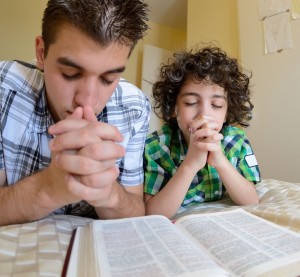 Christian parents teach their children to pray with confidence, they teach them that they can rely on God’s Spirit to guide and protect them, they teach them to say the Lord’s Prayer and call God their Heavenly Father, and they include them in the Christian community, teaching them to sing songs about how Jesus is their Lord. Also, like Paul does in Ephesians 6:1, Christian parents teach their children to live a certain way because Jesus is their Lord – in fact, in the verses directly after this, Paul commands them to do so: “Fathers, do not exasperate your children; instead, bring them up in the training and instruction of the Lord” (Ephesians 6:4). If Christian parents actually thought of their children as non-believers whom may or may not one day respond to the gospel when they are mature enough to make a profession of faith, then they wouldn’t disciple their kids in this way. If they didn’t relate to them as part of the family of believers, they wouldn’t teach them to pray to God as their Heavenly Father. At least, not if they were being consistent.
Christian parents teach their children to pray with confidence, they teach them that they can rely on God’s Spirit to guide and protect them, they teach them to say the Lord’s Prayer and call God their Heavenly Father, and they include them in the Christian community, teaching them to sing songs about how Jesus is their Lord. Also, like Paul does in Ephesians 6:1, Christian parents teach their children to live a certain way because Jesus is their Lord – in fact, in the verses directly after this, Paul commands them to do so: “Fathers, do not exasperate your children; instead, bring them up in the training and instruction of the Lord” (Ephesians 6:4). If Christian parents actually thought of their children as non-believers whom may or may not one day respond to the gospel when they are mature enough to make a profession of faith, then they wouldn’t disciple their kids in this way. If they didn’t relate to them as part of the family of believers, they wouldn’t teach them to pray to God as their Heavenly Father. At least, not if they were being consistent.
The reality is, converted parents generally relate to their children as “little converts” as well, extending to them many of the privileges that only should be extended to Christians. Now, they don’t do this because they think that their children are necessarily saved or have been born again. No, most parents on both sides of this debate believe that the potential date of their child’s actual salvation is in God’s hands, not theirs. Despite this, they will raise their child with the truths of the gospel being, not an option in the smorgasbord of life, but simply part of their reality. As I like to say, my children will be “marinated” in the gospel. This doesn’t secure their salvation, but it does give them an experience that is unique, compared to those who are introduced to the gospel as an adult non-believer.
I was converted to the gospel at aged 16. It was very much an experience of drawing a line in the sand and crossing it, into a new spiritual life and a whole new way of relating to the world. Despite this, I hope my daughter never has a “conversion” experience. In fact, I hope that her testimony is quite boring (by the world’s standards). I hope that if and when my daughter does make some form of a profession of faith, she will say, “I know this doesn’t sound very dramatic, but I have always believed that God loved me and Jesus is my Lord. I can never remember a time that I didn’t go to the cross for my forgiveness and all my life I have looked for my hope, identity, security and satisfaction in Christ. I’m not really sure when God saved me or when I ‘crossed over the line’ from death to life, but I’m thankful every day for his mercy.” Isn’t that the testimony we want for our kids? We want them to have David’s experience as he wrote it in Psalm 22:9-10 “You brought me out of the womb; you made me trust in you, even at my mother’s breast. From birth I was cast on you; from my mother’s womb you have been my God.” That is the Christian parent’s hope and goal for their child – that from their mother’s womb, Jesus is their Lord.
Now, if that is (God willing) my daughter’s testimony, when would baptism be most appropriate? When should she receive the symbol of God’s promises? When should she be given the sign that she “belongs” to Jesus? When did her journey with Christ begin? I reckon, from the very beginning.Â
But what if she rejects the gospel, you ask? What if she has an “anti-conversion” experience? Well, as I covered earlier, that is a question God’s people have faced from the very beginning – there were Jews who were circumcised into Israel, but in rejecting Yahweh, they showed they weren’t truly “Israel” (see Romans 9:6). As Christian parents, we don’t step over the line when we convert to Christ and then raise our kids back on the other side of the line. Not at all! We say, like Joshua “As for me and my household, we will serve the Lord” (Joshua 24:15). We raise our kids on the convert’s side of the line and we build the walls high, so that if tragically, they do end up turning away, they will have to actively and consciously reject the truth in order to do it.Â
When converts baptise their children, it is making the statement that the gospel is reality – both for them and for their children. As Peter declared on that wonderful day of Pentecost when he called people to turn to Christ and be baptised: “The promise is for you and your children and for all who are far off—for all whom the Lord our God will call.” (Acts 2:39) For a child of a gospel-saturated home, following Jesus is not an option that they need to one day consider when they are mature enough. It is simply reality. Jesus is Lord.
The reality of growing up in a Christian household
Now this is a point that I, unfortunately, can not express from my own experience. As much as I am grateful for the Catholic upbringing I had, I would not say that I was clearly taught the gospel. I also was baptised as an infant, and so I was conscience that I could become biased on this topic due to my lack of an example of a gospel-saturated credobaptist upbringing. So I asked around. I chatted with Christians who I knew and respected who had not been baptised as an infant. I asked them their experience. I asked them about when they got baptised and what prompted it. What I learned convinced me even more about the merits of pedobaptism and the problems of credobaptism.
Despite holding a view that baptism should follow believing, I did not find one who thought they actually got baptised when they believed. They were brought up (like any child in a pedobaptist household) being taught that Jesus was their Lord, that they could rely on the Holy Spirit and they should pray to God with confidence as their Heavenly Father. Their moment of becoming a believer was no real moment. It was organic. Some said that they always believed the gospel. Others spoke of a moment in their teens when they “owned” their faith as something that they truly knew was true for them as individuals rather than just kids brought up in a Christian home. Despite this moment of ownership being quite important, none of them thought that this was the moment they were saved. They acknowledged that they were probably saved at some point in their childhood.
Baptism then, was not a symbol that marked the moment of their conversion or their believing or their salvation. It marked, for most of them, the moment of their personal ownership. It was then that they had the courage and the maturity to give a “public declaration of faith” and in doing that, they became qualified (in their credobaptist church community) to be baptised.
For some it wasn’t even about their ownership of the faith. It was about obedience. They knew they had been believers for years, but as there was never any great “ownership” moment, they had simply put off getting baptised. Baptism, in the end, became simply a statement that they knew that Christians should get baptised and so now they were.
Now, don’t get me wrong. If you are a believer and you haven’t been baptised I think you should do it. Being obedient to Jesus’ instruction on this is important. I also think that owning your faith as something more than just a family tradition is a very important step for any kid brought up in a Christian household. But all the reasons I heard for why and when credobaptists got baptised, seemed to portray a distortion of the meaning of baptism to me.
Despite defending a “believer baptism” position, I never heard of a baptism at the point of belief or even to mark the point of belief. Instead, credobaptism seems to turn baptism into a rite of passage – a commemoration ceremony celebrating the entering into the world of being a mature adult, like a debutante ball or a bar mitzvah. The focus of this type of baptism can easily be the maturity of faith of the person getting baptised, rather than the gospel itself, and this causes many problems.
When baptism represents some sort of maturity level of faith or belief, then that becomes a recipe for self-doubt. Think about it. If you are given confidence that you’re a Christian because the church leaders let you get baptised – since only the truly saved are allowed to get baptised – and you proved that you qualify by this sense that you were now “owning” your faith, what happens if your faith grows cold? What happens if you stop having the confidence that you had on the day you professed your faith up the front at church? Well, what can easily happen is that you begin to doubt your own salvation. You wonder, “Were they right to let me get baptised?” The trap is that in credobaptism, baptism can become about the strength of one’s personal belief rather than the strength of God’s promises – and that is very shaky ground for a life of Christian confidence.
For my daughter, in her moments of doubt, I don’t want her looking to a decision she made once. I don’t want her to look to her own faith. I want her looking to the cross. If she is to look to her baptism as a place of reassurance and comfort, I don’t want it to symbolise to her that at one point in her teens or childhood she felt like she owned her faith. I want it to be because her baptism symbolises something much bigger than her fickle faith. It symbolises a picture of the message of the gospel and the cleansing that is offered to all. That is why we baptised our daughter at the point that she entered into a believing household, where the gospel would be taught to her every day.
This is why I said at the beginning of this article, I believe that it is not only gospel-honouring, not only biblically appropriate, not only scripturally permissible, but it is actually spiritually helpful for Christian parents to have their children baptised.
Conclusion
I don’t think pedobaptism is without its flaws and without its dangers. Too many children are baptised in households that do not teach the gospel, filled with people that do not know the gospel. These kids can grow up with a terrible false belief that they are right with God simply because they got splashed as a baby. That sort of scenario is tragic and I hope you have heard loud and clear that I do not believe that is what the bible teaches about how baptism should be practised or taught.
Despite this, after I have considered all the arguments from the bible, from history and from personal experience, when the ball hits the ground I have concluded that it was right and good for me to have my daughter baptised. I think the bible backs it up, both in the New Testament and across the sweeping themes of Scripture. I think history shows that it most likely is what Christians have always done. I think it reflects the reality of a Christian household. And I think it presents the gospel to my daughter in a way that will hopefully be a foundation for her confidence in the promises of God for her entire life.
My Other Articles on Baptism
I have now written 6 articles on this issue of baptism.
- 10 Alternatives to “Credobaptism” & “Pedobaptism”
- A silly list of alternative positions. Not to be taken seriously!
- Why Worry About Baptism?
- An introduction to this whole topic and why I have gone on this journey.
- Baptism & The Sinner’s Prayer
- My argument why baptism should accompany conversion.
- What Would Jacob Do?
- A short story set in the time of Acts to help me think about the context of baptism in the first century.
- 9 Things I Like About Credobaptism
- My presentation of the best arguments for credobaptism.
- Infant Baptism – Where I have landed
- My presentation of the best arguments for pedobaptism.
I hope these articles help you in your own thinking about baptism.
Please share your thoughts or your questions in the comments below.
(2668)



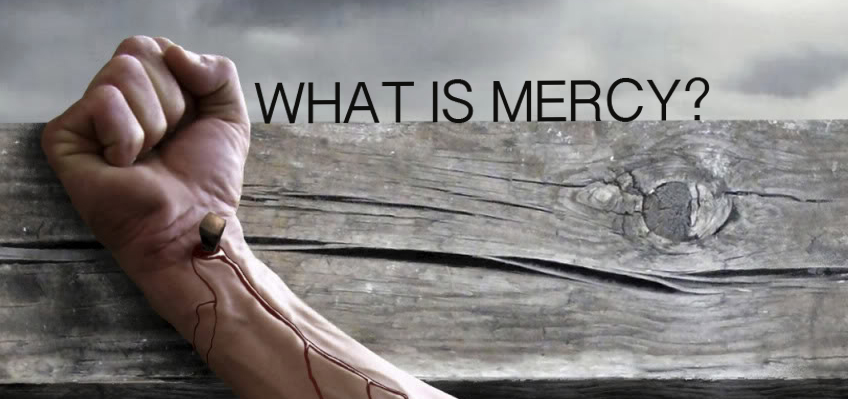
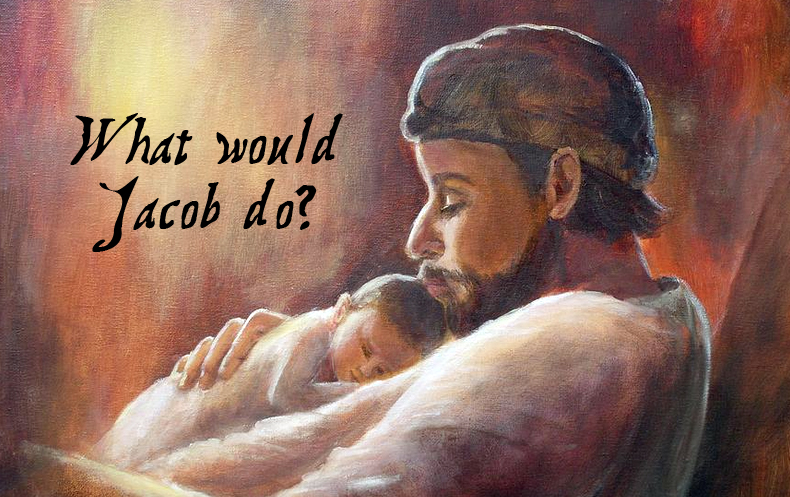
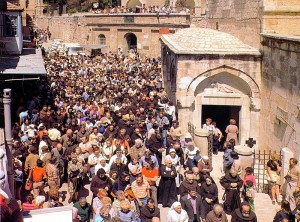 As he travelled through Jerusalem, with Mariah strapped to his back, he marvelled at the crowds of people from all walks of life. The sounds of different languages buying, selling and trading, the interesting colours of clothing and the smells of food and animals were an exciting feast for the senses.
As he travelled through Jerusalem, with Mariah strapped to his back, he marvelled at the crowds of people from all walks of life. The sounds of different languages buying, selling and trading, the interesting colours of clothing and the smells of food and animals were an exciting feast for the senses.